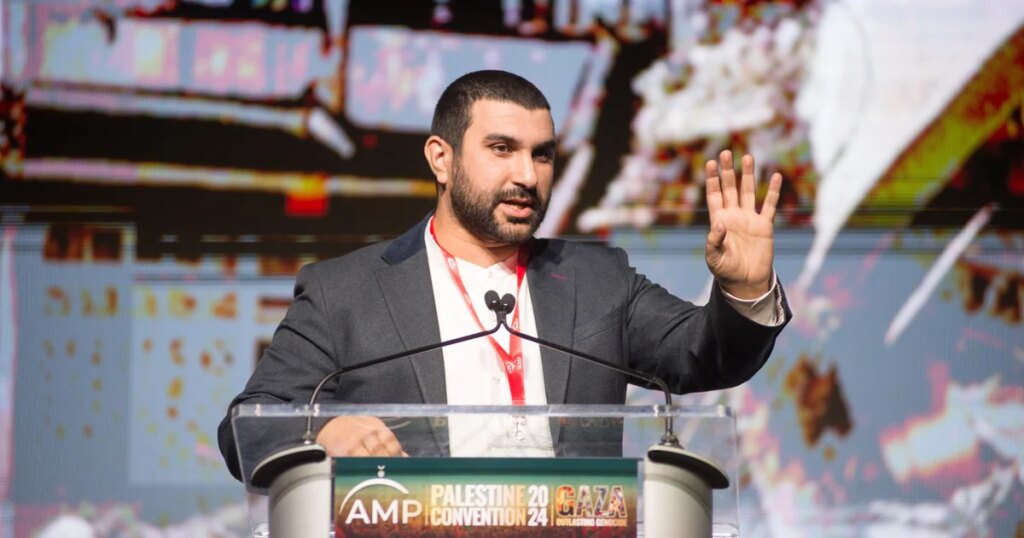A British journalist and political commentator, Sami Hamdi, detained by Immigration and Customs Enforcement (ICE) at San Francisco International Airport, is set to be released shortly. His lawyer announced that he has accepted the U.S. government’s offer for voluntary departure, freeing him from being removed from the country against his will. This decision has garnered support from various organizations, including the Council on American-Islamic Relations (CAIR).
| Article Subheadings |
|---|
| 1) Detainment of Sami Hamdi at SFO |
| 2) Government’s Allegations and Response |
| 3) Reactions from Family and Supporters |
| 4) Importance of Free Speech and Journalism |
| 5) The Implications of Hamdi’s Case |
Detainment of Sami Hamdi at SFO
On October 26, Sami Hamdi was detained at San Francisco International Airport after arriving in the U.S. for a speaking tour. He had entered on a visitor visa on October 19, but this visa was revoked on October 24. Officials from ICE have stated that the reason for his detainment was his alleged illegal presence in the country, despite the fact that he had complied with entry regulations upon arrival.
CAIR officials emphasized that Hamdi’s detainment raised significant concerns regarding the treatment of journalists and their freedom of movement. ICE has come under scrutiny for how they handle cases involving individuals who offer criticisms of government policies, especially regarding sensitive international issues.
Government’s Allegations and Response
In a statement released by the Department of Homeland Security, Assistant Secretary Tricia McLaughlin referred to Hamdi as “an illegal alien and terrorist sympathizer,” further stating that he “cheered on Hamas” following recent violent events. The official affirmed that Hamdi requested voluntary departure, indicating that ICE would facilitate this process.
McLaughlin further defended the government’s actions, stating, “Under President Trump, those who support terrorism and undermine American national security will not be allowed to work or visit this country.” This response highlights the government’s stance on national security, linking Hamdi’s criticisms of Israel to broader concerns about extremism.
Reactions from Family and Supporters
The news of Hamdi’s expected release was met with relief and gratitude from his family and supporters. His father, Dr. Mohamed Elhachmi Hamdi, took to social media to express joy over his son’s situation, thereby contextualizing the emotional toll it took on the family. He stated, “This brings joy to me, his mother, his wife, our entire family, and all of Sami’s supporters around the world.”
Dr. Hamdi also conveyed his confusion over the United States’ harsh treatment of his son, especially in a country known for upholding principles of freedom and expression. His sentiments echoed a sentiment of disbelief that a democratic nation would detain a journalist on such grounds.
Importance of Free Speech and Journalism
CAIR has argued that Hamdi’s case is emblematic of the precarious position journalists find themselves in, especially those whose work critiques U.S. foreign policy. A statement from CAIR implied that the government’s actions against Hamdi were part of a larger pattern of stifling open discourse about Israel and U.S. foreign policy.
The organization contended that the allegations of overstaying his visa were unfounded, stating that the visa was revoked without cause or prior notice. They further emphasized that officials failed to provide any evidence of criminal conduct or national security risks, thus calling into question the legitimacy of Hamdi’s detainment.
The Implications of Hamdi’s Case
Hamdi’s case has reverberated throughout the community of journalists and advocates for free speech. Hussam Ayloush, the CEO of CAIR’s California chapter, articulated that this situation raises alarms regarding the sacrifices made to First Amendment rights when a journalist’s work conflicts with governmental narratives.
The potential implications of Hamdi’s detainment could extend beyond his personal experience, signaling a chilling effect on journalists who cover contentious international matters. Advocacy groups are pushing for reforms to ensure that journalists can operate in the U.S. free from fear of prosecution or detainment for their perspectives.
| No. | Key Points |
|---|---|
| 1 | Sami Hamdi was detained by ICE at San Francisco Airport while on a speaking tour. |
| 2 | He has accepted voluntary departure from the U.S., avoiding forced removal. |
| 3 | Government officials labeled him a “terrorist sympathizer” in connection with his criticisms of Israel. |
| 4 | His family expressed joy but also confusion regarding the U.S.’s treatment of journalists. |
| 5 | Advocacy groups are concerned about the implications for journalistic freedom in the U.S. |
Summary
The case of Sami Hamdi reflects ongoing tensions in the U.S. regarding the intersection of national security, immigration law, and freedom of the press. His detainment and subsequent voluntary departure underscore the challenges faced by journalists critical of U.S. policies, while also raising questions about the principles of free expression and the protections afforded to members of the press. As advocacy groups continue to monitor the situation, the broader implications for journalistic freedoms in America remain a critical discussion point.
Frequently Asked Questions
Question: What led to Sami Hamdi’s detainment?
Sami Hamdi was detained by ICE for allegedly overstaying his visa after it was revoked shortly after his arrival for a speaking tour in the U.S.
Question: What is the significance of Hamdi’s case for press freedom?
Hamdi’s case highlights potential dangers to press freedom, particularly for journalists whose work critiques U.S. foreign policy regarding sensitive topics like Israel.
Question: How has the government justified Hamdi’s detainment?
Official statements from the Department of Homeland Security described Hamdi as a “terrorist sympathizer,” associating his detainment with national security concerns.
